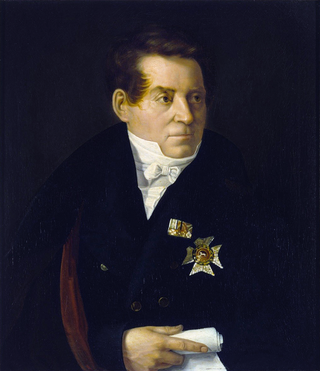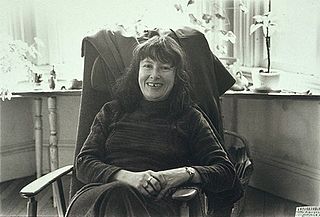Related Research Articles

Gerard Manley Hopkins was an English poet and Jesuit priest, whose posthumous fame places him among leading English poets. His prosody – notably his concept of sprung rhythm – established him as an innovator, as did his praise of God through vivid use of imagery and nature. Only after his death did Robert Bridges publish a few of Hopkins's mature poems in anthologies, hoping to prepare for wider acceptance of his style. By 1930 Hopkins's work was seen as one of the most original literary advances of his century. It intrigued such leading 20th-century poets as T. S. Eliot, Dylan Thomas, W. H. Auden, Stephen Spender and Cecil Day-Lewis.

Samuel Taylor Coleridge was an English poet, literary critic, philosopher, and theologian who, with his friend William Wordsworth, was a founder of the Romantic Movement in England and a member of the Lake Poets. He also shared volumes and collaborated with Charles Lamb, Robert Southey, and Charles Lloyd.

A genre of arts criticism, literary criticism or literary studies is the study, evaluation, and interpretation of literature. Modern literary criticism is often influenced by literary theory, which is the philosophical analysis of literature's goals and methods. Although the two activities are closely related, literary critics are not always, and have not always been, theorists.

Modern lyric poetry is a formal type of poetry which expresses personal emotions or feelings, typically spoken in the first person.

This article focuses on poetry from the United Kingdom written in the English language. The article does not cover poetry from other countries where the English language is spoken, including Republican Ireland after December 1922.

August WilhelmSchlegel, usually cited as August Schlegel, was a German Indologist, poet, translator and critic, and with his brother Friedrich Schlegel the leading influence within Jena Romanticism. His translations of Shakespeare turned the English dramatist's works into German classics. Schlegel was also the professor of Sanskrit in Continental Europe and produced a translation of the Bhagavad Gita.

Priscilla Denise Levertov was a British-born naturalised American poet. She was a recipient of the Lannan Literary Award for Poetry.
The Biographia Literaria is a critical autobiography by Samuel Taylor Coleridge, published in 1817 in two volumes. Its working title was 'Autobiographia Literaria'. The formative influences on the work were William Wordsworth's theory of poetry, the Kantian view of imagination as a shaping power, various post-Kantian writers including F. W. J. von Schelling, and the earlier influences of the empiricist school, including David Hartley and the Associationist psychology.
The "Graveyard Poets", also termed "Churchyard Poets", were a number of pre-Romantic poets of the 18th century characterised by their gloomy meditations on mortality, "skulls and coffins, epitaphs and worms" elicited by the presence of the graveyard. Moving beyond the elegy lamenting a single death, their purpose was rarely sensationalist. As the century progressed, "graveyard" poetry increasingly expressed a feeling for the "sublime" and uncanny, and an antiquarian interest in ancient English poetic forms and folk poetry. The "graveyard poets" are often recognized as precursors of the Gothic literary genre, as well as the Romantic movement.

Romantic poetry is the poetry of the Romantic era, an artistic, literary, musical and intellectual movement that originated in Europe towards the end of the 18th century. It involved a reaction against prevailing Enlightenment ideas of the 18th century, and lasted approximately from 1800 to 1850. Romantic poets rebelled against the style of poetry from the eighteenth century which was based around epics, odes, satires, elegies, epistles and songs.

Shakespeare's influence extends from theater and literatures to present-day movies, Western philosophy, and the English language itself. William Shakespeare is widely regarded as the greatest writer in the history of the English language, and the world's pre-eminent dramatist. He transformed European theatre by expanding expectations about what could be accomplished through innovation in characterization, plot, language and genre. Shakespeare's writings have also impacted many notable novelists and poets over the years, including Herman Melville, Charles Dickens, and Maya Angelou, and continue to influence new authors even today. Shakespeare is the most quoted writer in the history of the English-speaking world after the various writers of the Bible; many of his quotations and neologisms have passed into everyday usage in English and other languages. According to Guinness Book of World Records Shakespeare remains the world’s best-selling playwright, with sales of his plays and poetry believed to have achieved in excess of four billion copies in the over 400 years since his death. He is also the third most translated author in history.
Reginald A. Foakes was an English author and Shakespeare scholar. He has published works on Shakespeare and the Romantic poets and edited many of Shakespeare's plays in the Arden and New Cambridge editions. He also helped found the Shakespeare Institute in Stratford-upon-Avon. He was Professor Emeritus in the department of English literature at UCLA. He died at his home in Stratford-upon-Avon.
English literature is literature written in the English language from the United Kingdom, its Crown Dependencies and Overseas Territories, the Republic of Ireland, the United States, and the countries of the former British Empire. The English language has developed over the course of more than 1,400 years. The earliest forms of English, a set of Anglo-Frisian dialects brought to Great Britain by Anglo-Saxon invaders in the fifth century, are called Old English. Beowulf is the most famous work in Old English, and has achieved national epic status in England, despite being set in Scandinavia. However, following the Norman conquest of England in 1066, the written form of the Anglo-Saxon language became less common. Under the influence of the new aristocracy, French became the standard language of courts, parliament, and polite society. The English spoken after the Normans came is known as Middle English. This form of English lasted until the 1470s, when the Chancery Standard, a London-based form of English, became widespread. Geoffrey Chaucer (1343–1400), author of The Canterbury Tales, was a significant figure in the development of the legitimacy of vernacular Middle English at a time when the dominant literary languages in England were still French and Latin. The invention of the printing press by Johannes Gutenberg in 1439 also helped to standardise the language, as did the King James Bible (1611), and the Great Vowel Shift.
Colin Falck was a British literary critic and poet. He was associate professor in modern literature at York College of Pennsylvania.
Opium and Romanticism are well-connected subjects, as readers of Romantic poetry often come into contact with literary criticisms about the influence of opium on its works. The idea that opium has had a direct effect on works of romantic poetry is still under debate; however, the literary criticism that has emerged throughout the years suggests very compelling ideas about opium and its impact on Romantic texts. Usually these criticisms tend to focus on poets such as Samuel Taylor Coleridge, Thomas De Quincey and George Crabbe.
Romanticism originated in the second half of the 18th century at the same time as the French Revolution. Romanticism continued to grow in reaction to the effects of the social transformation caused by the Revolution. There are many signs of these effects of the French Revolution in various pieces of Romantic literature. By examining the influence of the French Revolution, one can determine that Romanticism arose as a reaction to the French Revolution. Instead of searching for rules governing nature and human beings, the romantics searched for a direct communication with nature and treated humans as unique individuals not subject to scientific rules.

The Vaishnava Padavi movement refers to a period in medieval Bengali literature from the 15th to 17th centuries, marked by an efflorescence of Vaishnava poetry often focusing on the Radha-Krishna legend. The term padavali has the literal meaning "gathering of songs".

Romanticism was an artistic, literary, and intellectual movement that originated in Europe toward the end of the 18th century. Scholars regard the publishing of William Wordsworth's and Samuel Coleridge's Lyrical Ballads in 1798 as probably the beginning of the movement, and the crowning of Queen Victoria in 1837 as its end. Romanticism arrived in other parts of the English-speaking world later; in the United States, it arrived around 1820.
Feminist poetry is inspired by, promotes, or elaborates on feminist principles and ideas. It might be written with the conscious aim of expressing feminist principles, although sometimes it is identified as feminist by critics in a later era. Some writers are thought to express feminist ideas even if the writer was not an active member of the political movement during their era. Many feminist movements, however, have embraced poetry as a vehicle for communicating with public audiences through anthologies, poetry collections, and public readings.

Elegiac Sonnets, titled Elegiac Sonnets, and Other Essays by Charlotte Sussman of Bignor Park, in Sussex in its first edition, is a collection of poetry written by Charlotte Smith, first published in 1784. It was widely popular and frequently reprinted, with Smith adding more poems over time. Elegiac Sonnets is credited with re-popularizing the sonnet form in the eighteenth century. It is notable for its poetic representations of personal emotion, which made it an important early text in the Romantic literary movement.
References
- ↑ Drake, Al. "The Organic Metaphor in Romantic Literature". History of Literary Criticism – Guides. Retrieved 7 November 2011.
- ↑ "Organic form". Encyclopædia Britannica Online. Encyclopædia Britannica Inc. 2011. Retrieved 7 November 2011.
- ↑ Henderson, Greig E.; Brown, Christopher (March 31, 1997). "Organic form". Glossary of Literary Theory. University of Toronto. Retrieved 7 November 2011.
- ↑ Bhatnagar, Manmohan K. (2000). Twentieth Century Literature in English. New Delhi: Atlantic Publishers & Distributors. p. 128. ISBN 81-7156-631-6.
- ↑ Bhatnagar, Manmohan K. (2000). Twentieth Century Literature in English. New Delhi: Atlantic Publishers & Distributors. p. 128. ISBN 81-7156-631-6.
- ↑ Foakes, R. A. (1989). Coleridge's criticism of Shakespeare: A selection. London: Athlone Press Ltd. pp. 1–53. ISBN 0-485-11349-X.
- ↑ "From the Academy of American Poets" . Retrieved 27 March 2011.
- ↑ Levertov, Denise (September 1965). "Some Notes on Organic Form". Poetry Foundation. 106 (6): 420–425. JSTOR 40732772.
- 1 2 3 Hallisey, Joan. F. "Denise Levertov (b. 1923)". Georgetown University. Retrieved March 27, 2011.
- ↑ Matthews, Bruce (2011). Schelling's Organic Form of Philosophy: Life as the Schema of Freedom. Albany: State University Of New York.
